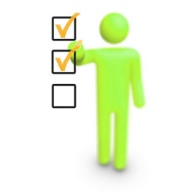
Frankie Rendon from the University of Illinois, Chicago posted an article with Teach Thought about the unprecedented change that is occurring across all library types in the United States. At the helm is technology and access to both print and “e” resources. The evolution of libraries is seen through the transformation of services and its impact on librarians working to meet the demands of patrons/users. Rendon believes that libraries are vital stating, “Today, librarians are more valuable than ever before due to their vast knowledge, expertise, community relations skills, and passion for imparting knowledge; all social literacies are as important now as ever.” Many librarians accomplish this by offering training, being stewards of resources, community advocates and spokespersons for literacy. Click here to read the full article, The Changing Landscape For Libraries & Librarians In The Digital Age (November 2013.)
Demonstrating competencies is one part of the equation; articulating relevancy is the other. Last week, Dean Vargas from the St. Cloud State University Learning Resources Services Library (Miller Center) invited CMLE staff and area academic librarians to participate in a day-long assessment workshop. Meagan Oakleaf, a national expert on assessment, facilitated each session. It served as a reminder that across library types, departments, and disciplines the importance of understanding the role of the library in the larger construct, in this case of an academic institution. And, faculty and staff are equally tasked with demonstrating the value added to the library by the services they provide. How can libraries/librarians demonstrate impact? Relevancy is the most powerful when impacts can be reasonably qualified or quantified. According to Oakleaf, this is accomplished when the needs and goals of an institution/library intersect the services, resources and expertise offered by the librarians and respective staff. Assessment evaluates these points of intersections and can be an influential tool in the decision making process.
Interesting in initiating or continuing assessment at your library? ProQuest, Springer, Library Journal and ER&L are sponsoring a series of three webcasts that can help-click here to learn more. Also, for additional information, below are a few books and journals (academic focused) that were identified at the workshop you may find helpful;
- Books
- Evaluating the Impact of Your Library (2012) by Sharon Markless, David Streatfield
- Library Assessment in Higher Education (2007) by Joseph R. Matthews
- Evaluation and Measurement of Library Services (2007) by Joseph R. Matthews
- Journals
- Evidence Based Library and Information Practice 2006, 1:4 by John Eldridge
- Higher Education Outcomes Assessment for the 21st Century (2013) by Peter Hernon (link)
- CMLE Previous Posts
